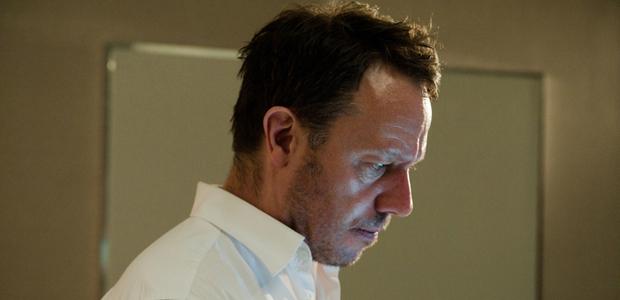Computer scientist stages play to illustrate risk of overpopulation
Scientist Stephen Emmott collaborates with theater director Katie Mitchell in an exploration of the future of life on Earth. (Photo courtesy of Ten Billion.)
For any theatergoers who stumbled into London’s Royal Court Theatre recently looking for a light summer comedy — well, this wasn’t it.
A middle-aged man stood alone on the stage, delivering a somber monologue.
“Earth is home to millions of species,” the man intoned. “Yet just one dominates it: us. Indeed our cleverness, inventiveness and activities are now the drivers of every global problem we face… In fact, I believe the situation we’re in right now could rightly be called an emergency, an unprecedented planetary emergency. And that’s what I’m here to talk about.”
Stephen Emmott is the creator and star — if that’s the right word — of the show “Ten Billion.” The title refers to the number of humans expected to be crowded onto the planet by the middle of the century.
Emmott is the head of computational science at Microsoft and a professor at Oxford University, so he likes experiments. And with this latest project he’s got a three-fer. Emmott says it’s “an experiment in theater, and an experiment in science, and an experiment in communication.”
Ten Billion isn’t so much a show as a lecture, but one presented in a theater, with theatrical lighting and music.
The challenge Emmott set himself was this: is it possible to give a talk that captures a whole boatload of scientific material, that synthesizes research from a range of different disciplines, but do it in just an hour, and in a language and form that would be accessible for a lay audience, all without it being dumbed down?
It was a tall order, but Emmott had help from a mainstay of Britain’s National Theater, director Katie Mitchell. Mitchell set Ten Billion in a rough replica of Emmott’s real life office, with a laptop, lots of books, a plant and a whiteboard.
“Normally when we make theater we employ actors to impersonate people like scientists,” Mitchell said. But “there’s something about the complexity of this subject matter that it seemed better to address it by getting the scientists themselves to stand up and talk about it. And then we would support that talk with theatrical means like video animation, lighting and music.”
Emmott performs his thought experiment by looking at various global systems and seeing how they all connect, and how humans have affected them—water, land, energy, climate.
His conclusion is that we have already exceeded the so-called “carrying capacity” of Earth — the maximum human population that the planet can sustain indefinitely without those support systems breaking down.
It’s a kind of big picture synthesis that Emmott says doesn’t happen very often even in the academic community.
“You go to one conference it’s all about water, you go to another it’s about the global carbon cycle, you got to another one it’s about terrestrial ecosystems,” he said.
Emmott says that narrow gaze is matched by the way the news media talks about the environment — not as a whole complex system, but bit by bit, as discrete pieces of news occur.
“Something typically like, ‘ocelots are not breeding as much this year,’ and you’re thinking, well what is anyone meant to make of that story?” he said. “I always imagine this picture of someone saying ‘Doris, ocelots are not breeding today, what do think about that?’ I mean, you can’t make sense of the bigger picture about ecosystem function, about ecosystem loss, about the degradation of the entire global food chain, with those sorts of pictures.”
But Emmott says the changes required of humans to fix things are of a scale so enormous that many of us prefer not to think about the problem at all.
“A very large proportion of us have got our head in the sand, whether it’s governments, individuals, businesses,” he said.
Presenting the whole problem on stage, in just an hour, is an effective means of dragging a head out of the sand. In a theater it’s not that easy to stop, put your fingers in your ears and say “la, la, la,” this isn’t happening.
But in terms of making a significant impact — well, you’ve got to get people in the door. And Emmott’s audience for Ten Billion has been small. Producers say the Royal Court Theater was full for most of the short London run, but it holds only 88 people.
The reviews were good, though, and Emmott says people who’ve seen the show have later gotten in touch, telling him that it made a lasting impression.
The Ten Billion experiment has now been staged in London and in France, but Emmott knows digital distribution is the only way to reach vast numbers of people.
That’s why he’s hoping he might get a chance to take it to one of the most influential 21st century stages — a TED talk.
Every day, reporters and producers at The World are hard at work bringing you human-centered news from across the globe. But we can’t do it without you. We need your support to ensure we can continue this work for another year.
Make a gift today, and you’ll help us unlock a matching gift of $67,000!
